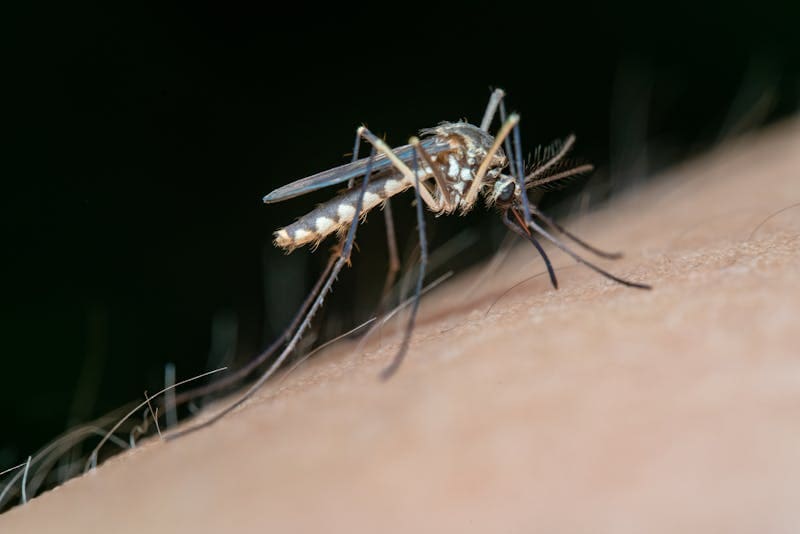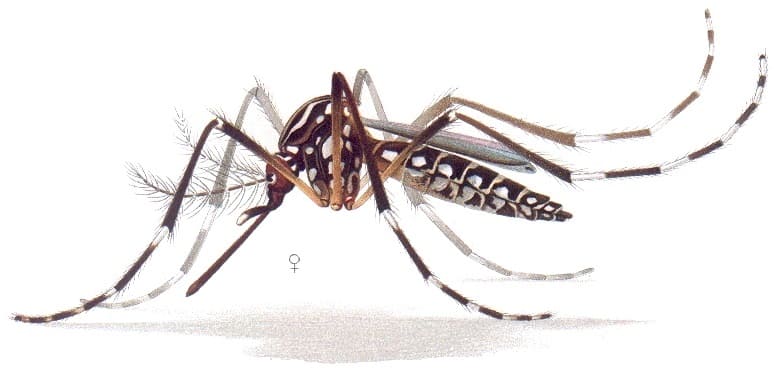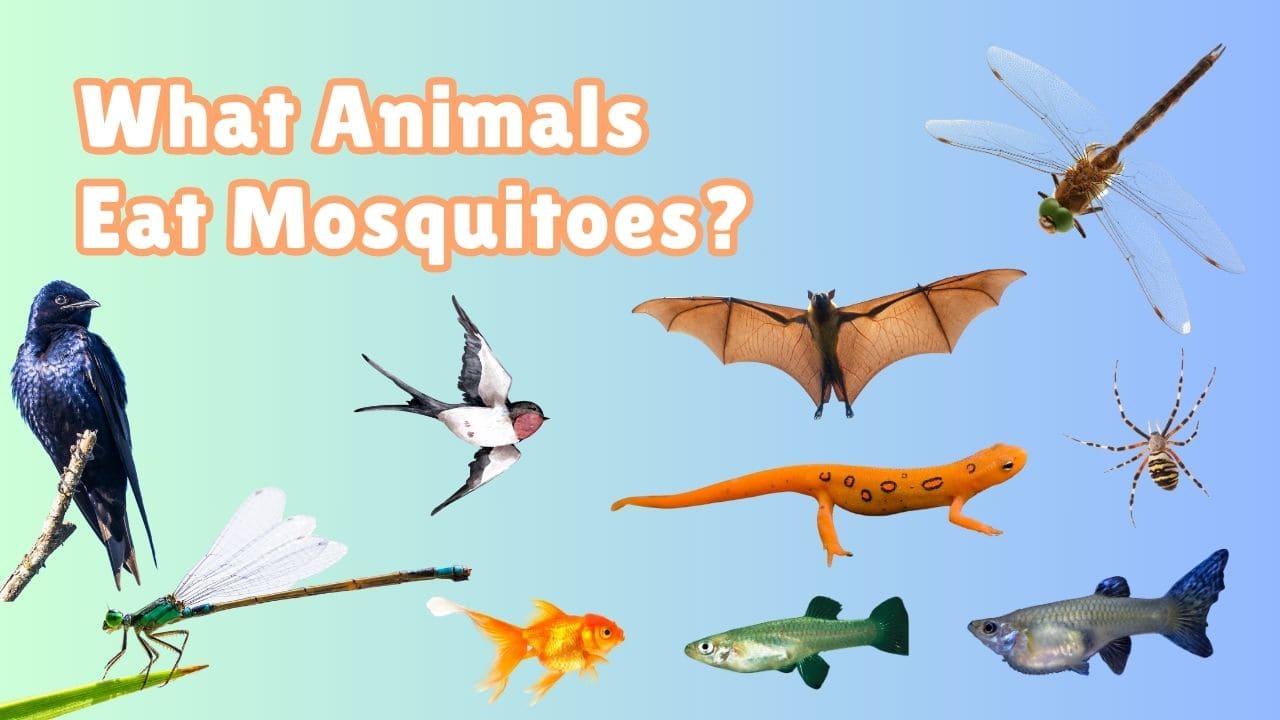Table of Contents
What are mosquito predators?
Mosquito predators are those animals, birds and insects that prey on mosquitoes at different stages of their life cycle, preferably on mosquito larvae (larval stage) and adult mosquitoes (adult stage). These are often referred to as natural mosquito predators as they naturally hunt for and feed on mosquitoes and their larvae.
They limits the usage of any chemical based insecticides and treatments that will harm the environment and also being toxic to our skin and health.
Hence, while playing an important role in our ecosystem they also provides a natural way of controlling mosquito populations while keeping our surrounding mosquito free and protected from mosquito-borne diseases like malaria, dengue, chikungunya, zika virus, etc.
Role of natural predators in mosquito prevention and control
Naturally preventing mosquito larvae to grow and emerge into adult pests and thus controlling their overall population, is the prime role of these natural mosquito predators. They play many important role apart from controlling diseases, and reducing many lifestyle discomforts due to mozzies.
- They play a very important role by breaking the breeding cycle of mosquitoes at the larval stage, while few birds and insects also targets adult mosquitoes.
- They helps to maintain a healthy ecosystem as no toxic and harsh chemicals are used for mosquito control
- Any use of chemicals like DEET, picaridin, etc. also affects other beneficial organisms which can be conserved by introducing and attracting natural mosquito predators.
- They prevent any spread or transmission of vector borne diseases, by controlling the mosquito population at an early stage of their life cycle.
- Some natural mosquito predators like goldfish, killifish, mollies, etc. are beautiful and attractive and thus enhance the aesthetic of your garden pond or aquariums.

Image Credit: Pexels by Jimmy Chan
Advantages of Natural mosquito predators
The advantages of using these mosquito eating animals, birds and fishes to control mosquito infestation and further halt any further breeding, are as follows:
- Its a chemical free method of mosquito control.
- It gives long term advantage for a one time investment with zero to minimal maintenance.
- They do not harm other aquatic animals, insects and organisms; thus protecting the natural ecosystem.
- They helps in preventing spread of mosquito-borne diseases.
Animals that eat mosquitoes | Mosquito predators
You all might be curious to know, How do bats and birds help to control the mosquito population? Yes they do help in this regard. Some of the most effective mosquito predators, including bats, birds and animals that eat mosquitoes are:
1. Fish that eat mosquito larvae
- Mosquitofish: This is the most effective natural mosquito predator, mainly consume mosquito larvae from standing waters. They are very good at controlling mosquito breeding in outdoor ponds, water features, and aquariums.
- Guppies: These also are good mosquito predators not that effective but can contribute enough when employed in combination with other mosquito population control measures.
- Koi: These are used in smaller water bodies like aquariums and indoor water features, as they also gives an aesthetic look due to their beautiful and colorful appearance.
- Goldfish: They also eat mosquito larvae when they are young. Not that effective but goldfish serves a dual purpose when added to aquariums and ponds.
For more details on mosquito larvae eating fish, Check the article below:
📰 Must Read,
✔️ What Fish Eat Mosquito Larvae? List of Mosquito Larvae Eating Fish
✔️ What Plants Attract Mosquitoes?
2. Bats as mosquito predators
Bats occasionally eat mosquitoes, but they do not hunt them or depend on them. Mosquitoes usually make up to around 1% of their diet. But they can eat many other night-flying mosquito sized insects including mosquitoes, wasps, moths, beetles, crickets, chinch bugs, etc. One brown bat can eat upto 1000 insects in just an hour.
3. Amphibians
- Frogs, Toads and tadpoles: Frogs and toads rarely eat mosquitoes and their larvae, and it is not their main diet. Adult frogs and toads do eat some mosquitoes, but the tadpoles are mainly herbivores and feed on algae and aquatic plants. Some species of tadpoles have been reported to eat mosquito larvae, these includes the spadefoot toad, giant tree frog, green tree frog, etc.
- Aquatic Turtles: The red-eared slider turtles, considered as the most voracious turtles do eat mosquitoes at their young age. They can eat up to 500 mosquito larvae in a day. While few studies have been reported that turtles in roadside ditches have reduce the mosquito population by 99%, which is remarkable. Only the juvenile turtles are carnivores and eat mosquito larvae while the adults are herbivores.
4. Reptiles
- Lizards: Lizards eat many household insects like silverfish, spiders, snails, etc. including mosquitoes. Not that effective against reducing and controlling mosquito populations.
- Eastern Red-spotted Newt: Not only mosquitoes, but they feed on variety of insects, snails, beetles, ants, mollusks, crustaceans, young amphibians, frog eggs, worms, etc. and helps in controlling of insect populations.
Birds which are natural mosquito predators
There are few birds species that prey on adult mosquitoes like other flying insects, very effectively and thus contributes towards natural mosquito control. The list of birds that eats mosquitoes are:
- Purple Martins
- Swallows
- House Wrens
- Eastern Kingbird
- Warblers
- American Robin
- Nighthawk
- Chimney Swift
- Eastern Phobe
- Bluebirds
- Hummingbird
- Cardinals
- Chickadees
- Waterfowls like ducks and geese
Insects which are natural mosquito predators
Many insects prey on mosquitoes as well as mosquito larvae including flying insects that eat mosquitoes, and they serves as excellent natural mosquito predators.
- Dragonflies:
- Damselflies:
- Spiders:
List of best mosquito predators
| Sr. No. | Best Mosquito Predators | Feed on | Effectiveness |
|---|---|---|---|
| 1. | Mosquitofish | Mosquito Larvae | Most efficient |
| 2. | Guppies | Mosquito Larvae | Very effective |
| 3. | Purple Martins | Adult Mosquitoes | Very effective |
| 4. | Dragonflies | Adult Mosquitoes | Very effective |
| 5. | Swallows | Adult Mosquitoes | Quiet effective |
| 6. | Bats | Adult Mosquitoes | Quiet effective |
| 7. | Spiders | Adult Mosquitoes | Good |
| 8. | Damselflies | Adult Mosquitoes | Good |
As the list consists of many known mosquito predators, but you might be surprised that it doesn’t include the “mosquito eaters” or “mosquito hawks” or “daddy long legs” as they are popularly known. These are actually crane flies and they do not eat mosquitoes, and its just a myth that crane flies eat mosquitoes. Mosquito eaters do not not actually eat mosquitoes.
How to attract mosquito predators?
To attract mosquito predators you must lure them with a peaceful habitat including native trees and plants, along with suitable shelter and nesting place, as listed below:
- Providing source of water and feeders like garden ponds, bird baths, bird feeders, water lilies and water lettuces to attract mosquito predators like birds, frogs, toads, water fowls, etc.
- Create a natural ecosystem with native trees, bushes, flowering plants, and insects where these mosquito predators can thrive.
- Grow native plants to attract bats, birds and insects that eats mosquitoes to provide shelter and habitat.
- Build bird houses, nest boxes, bat houses, roosting bars, perching spots, etc. to provide shelter for birds and bats.
- Offer favorite meals to attract birds by keeping open tray of mealworms, suet, seeds, mashed fruits, berries, millets, sunflower seeds, thistle or nyjer seeds, etc.
- Don’t spray insecticides as this will reduce the number of insects and worms they will need to feed on.
- Plant native flowering plants and bird feeders with sugar solution to attract hummingbirds.
- Grow dense trees and shrubs as this will require by some mosquito eating birds as a nesting place safe and secure from predators.
- Grow tall grasses and plants that attracts dragonflies like meadow sage, black-eyed Susan and white yarrow.
Plants that attract mosquito predators
In order to provide them with nesting place, food and shelter, you must grow certain plants that will encourage these mosquito predators and increase their populations. Some of the plants that you can grow to attract these mosquito predators include:
- Water lily
- Meadow sage
- Swamp Milkweed
- Wild Celery
- Dwarf Sagittaria
- Asiatic Lily
- Black eyed Susan
- Jow-Pye Weed
- Yarrow
Apart from these flowers and plants; there are native grasses, flowering plants like marigolds and lavender that actually attracts pollinators which in turn attracts dragonflies. There are trees, dense shrubs and bushes which attracts bats and mosquito eating birds.
Mosquito predators that feed on Asian Tiger mosquitoes
The Asian Tiger mosquito (Aedes albopictus) is a highly dangerous and invasive species of mosquitoes which are active even during the day. There are some Asian Tiger mosquito predators which prey on the larvae and adults of these aggressive species of mosquitoes, as listed below:

- Dragonflies: Dragonflies as mosquito predators, are the most efficient for consuming mosquito larvae. The nymphs and adult of dragonflies both are equally efficient mosquito predators. The nymphs are good at eating mosquito larvae in aquatic sources like standing waters, ponds, etc. while the adult dragonflies act as hunters and catch adult mosquitoes in flight. Dragonfly mosquito predators can consume a large number of mosquitoes (upto 100) in a single day.
- Damselflies: Damselfly mosquito predators are similar to dragonflies and feed on larvae as well as adult mosquitoes. The larvae of damselflies eats mosquito larvae from standing waters and prevent growing into adult mosquitoes thereby controlling their population. While adult damselflies being somewhat smaller than dragonflies, catch the mosquitoes in mid-air, proving themselves as equally good mosquito hunters.
- Elephant Mosquito (Toxorhynchites): The elephant mosquito, is the largest known species of mosquitoes which can grow upto 18mm. These belongs to those mosquito species that do not consume blood. The larvae of these elephant mosquitoes eats larvae of other mosquitoes and therefore they get enough protein to continue their breeding cycles, without any need of blood meals.
- Flat worms: These are phylum of simple, soft-bodied, unsegmented invertebrates which are mosquito predators
- Swimming Beetles: Small Aquatic swimming beetles are also known to be mosquito predators that feed on mosquito larvae.
- Paramecia (Ciliates): The ciliates of certain species are also proposed in many research studies as a biological remedy in controlling mosquito populations.
- Copepods: Though they are not found in the habitats of the Asian Tiger mosquitoes, but it has been found that they can consume larvae of Asian Tiger species. There is a possibility of acquiring control on tiger mosquitoes, by accommodating different genres of predatory copepods along with Asian Tiger mosquitoes..
- Spiders: There are certain spider species that occasionally eat mosquitoes, but the number is so small that we cant expect any considerable reduction in the mosquito population.
- Bats: Bats also eat mosquitoes, but that is not a primary food source and therefore they can’t contribute much towards controlling their populations.
Conclusion
Natural mosquito predators provides an eco-friendly approach towards reducing the populations of dreadful mosquitoes. The contributions made by mosquito eating birds like purple martins and swallows to the mosquito predators like dragon flies and damselflies, the use of chemicals have been put to a minimum.
Even governments and control boards, health and safety departments of many countries have joined hands with their in-house departments like wildlife, forest, marine, environmental boards, etc. to make use of biological control methods of controlling mosquito populations.
Attracting mosquito predators to your garden, ponds and backyard will also develop a more thriving ecosystem which includes useful insects, bacteria and pollinators.
Thus, we can keep a check on their population along with creating a balanced eco-system that will provide a safer and more comfortable mosquito-free environment.
Frequently Asked Questions (FAQs)
-
Who are the natural predators of the Asian tiger mosquito?
Dragonflies, damselflies, elephant mosquito, flat worms, swimming beetles, copepods, paramecia (ciliates), spiders and bats are the known natural predators of the Asian Tiger mosquito.
-
How effective are natural predators, like fish and insects, in controlling mosquito populations?
Some of them like mosquitofish (gambusia) and dragonflies are very effective in hunting mosquitoes and feeding on mosquito larvae. While some others like goldfish, betta fish and spiders, frogs, etc. are not that effective and not contribute much.
-
What animals eat the most mosquitoes?
Not animals its the fish, called as mosquitofish that eats the most mosquito larvae in a day. It can aggressively hunt on mosquito larvae and control their populations in ponds and water features. There are many mosquito control programs that incorporates the use of mosquitofish.
-
What is the best natural predator for mosquitoes?
Mosquitofish and dragonflies are the 2 most effective natural mosquito predators. The mosquito fish will only eat mosquito larvae from water sources while the dragonflies are effective in eating larvae (the nymphs of dragonflies eats mosquito larvae) as well as hunt adult mosquitoes in mid-air.
-
Is there a bug that eats mosquitoes?
Yes, there are bugs like dragonflies which is the the most effective against eating mosquitoes and consume a large number of mosquitoes in a day. Similarly, there are damselflies and spiders that feed on mosquitoes.
-
What is the most aggressive species of mosquito?
The most dangerous, aggressive, invasive and active species of mosquito is the Asian Tiger Mosquito. They are also active during the day and are attracted by dark colored clothing, perspiration, carbon dioxide, etc. and mostly bites humans, dogs, squirrels, and other animals.

